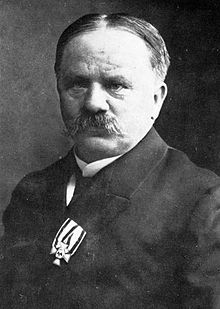Hans Ebel (pastor)
Hans Ebel (with full name Johannes Michael Ebel) (born September 26, 1859 in Bischofsburg , East Prussia Province , † August 23, 1920 in Muschaken ) was a German pastor in Masuria.
Life
As the son of pastor and school founder Johannes Wilhelm Ebe '(1824–1900) from the Neidenburg line of the Ebel family , he attended the Kgl. Wilhelmsgymnasium in Königsberg . After graduating from high school, he studied Protestant theology at Albertus University . In the winter semester of 1879/80 he was the fourth of his family to be active in the Corps Masovia . Ordained on November 25, 1883 , he received his first pastor in Ostrokollen , Lyck district . There he met his future wife, Emma Minna Julie, geb. Saworra, whom he married in 1885. The couple had two daughters and five sons, two of which in the First World War fell. From 1894 until his death, for 26 years and the First World War , he was pastor in Muschaken , Neidenburg district .
To combat the prevailing unemployment , Ebel founded a cooperative with the largest Raiffeisen Association in East Prussia and the second largest in the German Reich , which flourished despite the poor soil and prompted farmers to invest in their farms. Modern technology and artificial fertilizers and animal feed were tried and introduced. A goods cooperative sold the products and had its own silo storage and loading rails. After two decades it had an annual turnover of around 30 million marks. Social progress was not lacking. In 1909, almost all farm workers in the Muschaken parish had become landowners and some workers had become small farmers. Ebel reduced the burden of debt for the weak.
When a windbreak devastated the forests, Ebel made sure that his community members got the wood at a moderate price and earned around 7,000 marks in one year . When almost the whole village burned down in 1900, Ebel managed in two days to get two thirds of the total amount of the timber and that after four weeks, in time for the harvest, most of the barns were up again. With these achievements, the population also took confidence in their pastor in spiritual matters. The previously flourishing sectarianism declined. For the social and educational needs of the community, a community hall with a library was built. Especially for the Ward and care of infants were community nurses set. Further education schools and housekeeping schools, choral societies and gymnastics clubs emerged. While the rural exodus spread in the otherwise poor Masuria , the population of Muschakens rose from 4,500 to 5,200. When the Imperial Russian Army marched into East Prussia in August 1914 , the parishes on the border with the Tsarist Empire were first devastated. It is not least Ebel's merit that Muschaken did not collapse under this.
Ebel also worked far beyond the boundaries of his community. He was one of the leading men in the Raiffeisen organization, tried to inspire the Evangelical Social Congress for his work and promoted the settlement work of the East Prussian Land Society .
“You often hear it said that the Raiffeisen Association causes a lot of trouble and a lot of work. Work has brought me a lot. Those who shy away from work in their pursuit of welfare should keep their hands off it. He's not good at it. I've never had any trouble. Is that what you call the trouble of overcoming people's lack of understanding? What can people do if the Creator has given them ignorance on their way. And God in his wisdom distributed ignorance evenly to all classes. But we are called to also educate people. "
The Emmaus boys' education home , which he initiated in 1903, is a permanent memorial of Ebel's work and community spirit . From 1948 it was a barracks of the Polish Armed Forces . The building has been empty since 1992.
See also
Awards
swell
- Bernhard Koerner : German gender book , sixty-eighth volume. CA Starke Verlag, Limburg an der Lahn 1930, in: CD-ROM 9, German Gender Book, Volume 65–72. ISBN 3-7980-0409-9 .
- Friedrich Lembke: Obituary for Hans Ebel. Das Land, November 15, 1920 Digitized .
- District community Neidenburg (ed.): The district Neidenburg / East Prussia in the picture. P. 251.
Individual evidence
- ↑ Kösener Corpslisten 1930, 89/746.
- ^ Bernhard Koerner : German gender book , sixty-eighth volume. CA Starke Verlag, Limburg an der Lahn 1930, p. 96 ff.
- ↑ According to the parish manac of 1911, the Muschaken parish still included 21 political communities with a total of 4,800 souls.
- ↑ release R. Kayss, Kreisgemeinschaft Neidenburg.
- ↑ Jürgen Herrlein , Amella Mai: Directory of all members of the Corps Masovia 1823 to 2005. Potsdam 2006.
| personal data | |
|---|---|
| SURNAME | Ebel, Hans |
| ALTERNATIVE NAMES | Ebel, Johannes |
| BRIEF DESCRIPTION | German Protestant theologian |
| DATE OF BIRTH | September 26, 1859 |
| PLACE OF BIRTH | Bischofsburg , East Prussia |
| DATE OF DEATH | 23rd August 1920 |
| Place of death | Muschaken , East Prussia |
